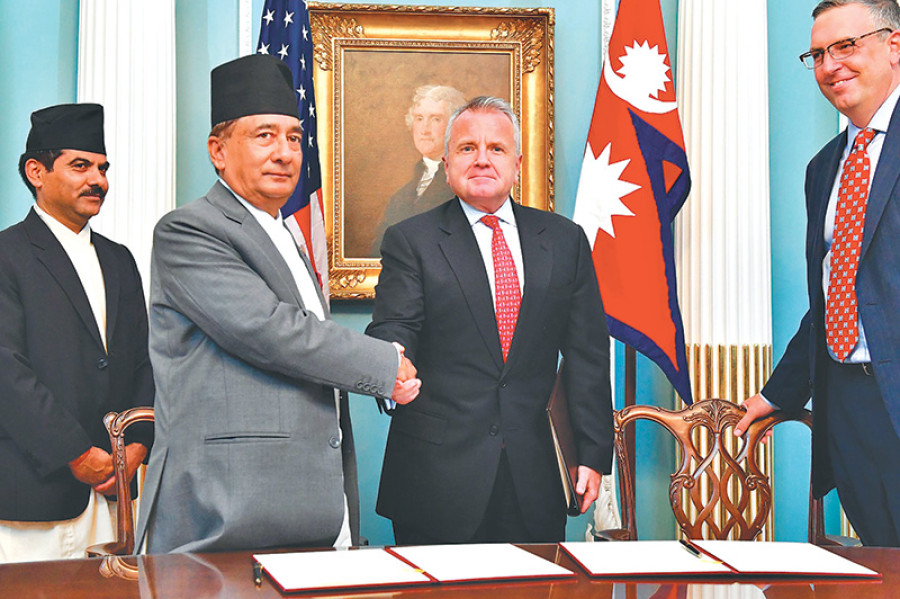Money
Nepal must wait for ‘at least a year’ to tap $500m US grant
Nepal will have to wait for at least a year to tap the grant of $500 million provided by the US government, as various legal and other processes have to be followed to lay the groundwork to make appropriate use of the fund.
Rupak D. Sharma
Nepal will have to wait for at least a year to tap the grant of $500 million provided by the US government, as various legal and other processes have to be followed to lay the groundwork to make appropriate use of the fund.
The Nepal government and the US government’s Millennium Challenge Corporation (MCC) on Thursday signed a $500-million grant agreement in the US, to help Nepal build robust energy and transport network, which will enable the country to attract more domestic and foreign investment, foster economic growth and reduce the incidence of poverty.
The agreement was signed by Finance Minister Gyanendra Bahadur Karki and Acting MCC CEO Jonathan Nash at the US State Department in Washington, DC. US Deputy Secretary of State John J Sullivan was also present on the occasion.
This is the single biggest grant provided by a single development partner to Nepal. The fund was provided in the year when both countries are celebrating 70th anniversary of their relations.
“We can point to this MCC compact as a clear demonstration of our strong partnership,” a statement issued by the US Embassy in Kathmandu quoted US Deputy Secretary of State Sullivan as saying.
The $500-million grant is part of the $630-million “compact programme” designed by the MCC for Nepal. To implement the programme, the Nepal government has expressed commitment to contribute $130 million, which is the single largest up-front country contribution in MCC’s history.
In order to make use of the grant, the MCC must set up a project implementation agency in Nepal called Millennium Challenge Account to manage and oversee all aspects of implementation, according to Baikuntha Aryal, head of the International Economic Cooperation Coordination Division at the Ministry of Finance, who was directly involved in all the processes in the run-up to signing of the agreement.
The project implementation agency must be formed as per the provision in the Development Committee Act, for which a formation order must be issued. “In other countries, it takes up to 18 months to complete all the processes to establish the implementing agency,” Aryal said. “We are planning to complete that process within a year.”
During this one-year period, the government also intends to procure land required for projects selected by the MCC and prepare procurement documents.
“Once all these works are completed, the grant agreement will formally come into effect,” said Aryal. “We will then be given a deadline of five years to complete all the projects under the MCC’s compact programme. If we cannot finish our job in five year’s time, the fund will go back to the US.”
This means works have to move ahead rapidly after the five-year clock starts ticking.
The MCC board of directors had selected Nepal for its compact programme in December 2014. Nepal was selected for the MCC programme “in recognition of the country’s efforts to establish rule of law and democratic institutions, and its strong performance on MCC’s policy scorecard”.
Since then, the MCC has agreed to support two broad projects in Nepal: the Electricity Transmission Project and the Road Maintenance Project, as energy shortage and inferior transport network are two binding constraints for Nepal’s rapid economic growth.
Of the investment being made in Nepal, a bulk, or $520 million, will go towards development of 300 km of 400kV transmission lines from eastern to western parts of the country and three power substations.
Another $55 million will be used to maintain 305 km of road segments.
The remaining amount will be used for activities like monitoring and evaluation of projects being implemented, hiring of procurement and fiscal agents, and covering other administrative expenses.
“[These investments] will surely create a lasting impact on Nepal’s sustainable development for generations to come,” Finance Minister Karki said. MCC’s investment is expected to benefit about 23 million people in Nepal, according to the US Embassy statement.




 9.51°C Kathmandu
9.51°C Kathmandu















